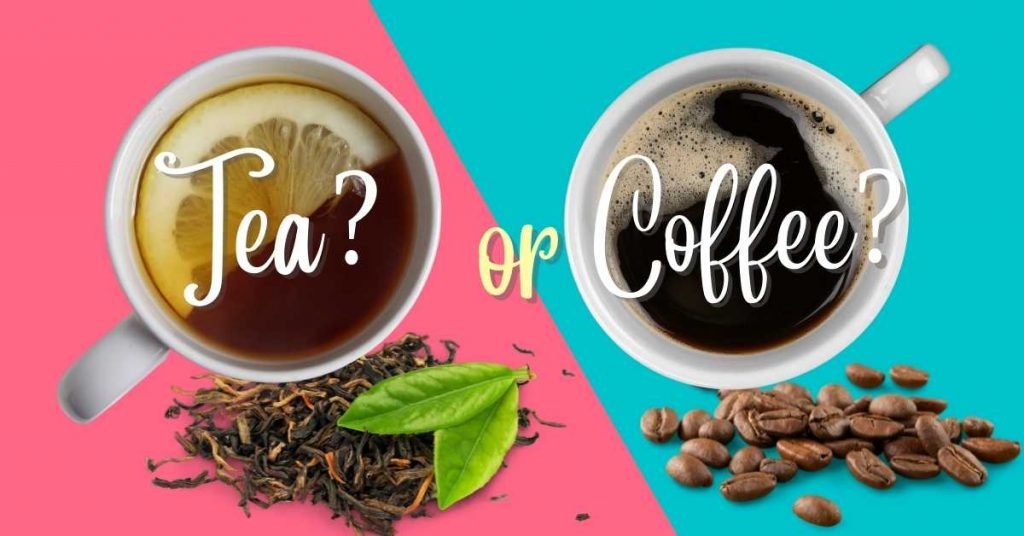If you were to look at a cup of coffee next to a cup of tea and were asked to try and distinguish which is better, what would you say? There’s a lot that the naked eye can’t see lurking in both of those cups. What we are about to reveal just might raise a few eyebrows!
Is Tea Healthier Than Coffee?
Many of us wonder how much caffeine is in tea vs. coffee. How do you know which is better to enjoy? Well, we will take a deeper look at everything you need to know about both of these beverages. There’s much more to comparing caffeine in tea or coffee.
What Is The Difference Between Tea And Coffee?
If you were to sit a cup of tea next to coffee, there are noticeable physical differences readily apparent. Tea looks weaker in color and body, whereas coffee is robust, black, and full-bodied. Coffee typically has a single aroma; it smells like coffee and tends to be strong. Tea, on the other hand, has a more subtle aroma that can have many different aromas (depending on the type of tea.)
Whether someone prefers tea or coffee, it all comes down to a preference in taste. Some interesting statistics from Statista note that age plays a vital role in whether coffee or tea is the beverage of choice. The younger population (under 30) prefers tea, whereas coffee is preferred by those who are older.
A Comparison Of Tea And Coffee
What you can’t see in these two cups sitting side-by-side filled with tea and coffee is what lies within the beverage itself. There’s a lot going on inside each of these drinks!
Caffeine
Caffeine is perhaps the first thing we look at when choosing tea or coffee. You might be surprised to find out the differences in caffeine levels in tea and coffee. Keep in mind that the FDA (Federal Drug Administration) recommends no more than 400 mg of caffeine intake per day. That would be about 5 (six-ounce) cups of coffee per day or 5-6 cups of tea per day. That small espresso so many of you love is just about your entire day’s allowance when it comes to caffeine!
A six-ounce cup of regular black coffee contains about 71 mg of caffeine. Espresso (a popular coffee) has a whopping 384 mg of caffeine. Black tea caffeine vs. coffee has about a 40% difference, with coffee being higher. A six-ounce cup of black tea has about 47 mg, and green tea has between 20-30 mg. Tisanes (herbal tea) do not contain caffeine.
So, when it comes to the highest caffeinated drink between tea or coffee, coffee is the highest caffeine-containing drink with black tea following. Caffeine in green tea vs. coffee puts green tea at the top of the list as having less caffeine. Green tea and tisanes (herbal tea) offer better caffeine alternatives among all of these drinks.
Benefits
According to a published research article entitled “Tea and Health: Studies in Humans,” tea provides many benefits, which makes it highly desired. Consuming 2-3 cups of tea a day helps to reduce the risk of heart disease and progressive neurological diseases such as Parkinson’s.
Tea is known as being the beverage of choice to help aid in weight loss. Constituents in tea also help to reduce associated pain with chronic inflammatory conditions such as arthritis. Diabetes and cancer risks are decreased by drinking tea, as is any risk of heart-associated conditions.
Coffee
An article published by Johns Hopkins Medicine lists several health benefits from drinking coffee. The article notes that those who consume coffee have a reduced risk of fatality caused by cardiovascular events such as stroke or heart disease. Drinking coffee also reduces the risk of diabetes by enabling better optimization of glucose.
More reasons to drink coffee include lowering the risk of developing Alzheimer’s and Parkinson’s disease. When it comes to minimizing the risk of colon cancer, coffee can very well be the go-to beverage. Women over 65 years of age who consume 2-3 cups of coffee per day are less likely to have dementia-related conditions.
Taste And Types
Tea and coffee come in various types that have different aromas, tastes, and colors. Both drinks can literally have hundreds of various flavor profiles which are specific to a particular type of tea or coffee.
There are different types of tea that all have varied flavor profiles. For example, black tea such as Earl Grey has a citrusy, floral, malty flavor. Green tea may have a grassy, earthy, sweet flavor. White tea is subtle, sweet, and has the purest bright taste of all teas.

Coffee flavor differences can come from a particular roast, have a bean blend of different coffees from various origins, or be prepared in unique ways, all of which produce a particular tasting coffee.
If you were to ask a tea drinker their interpretation of taste in coffee, you might discover that they say coffee is strong and very bitter. Likewise, if you ask a coffee drinker what they think of tea flavor, they will most likely tell you tea tastes diluted and very weak.
Did you know that tea has hundreds of different flavors and aromas? Check out the aroma and flavor wheel to find out more!
Why not consider a “Tea Journey” to experience the layers of surprises that await in different teas? Not sure which is better? The Tea Lady is always ready to answer questions and guide you along the way!
Side Effects
Unfortunately, excessive consumption of tea or coffee (over 400 mg of caffeine per day) can result in rapid heartbeat, rise in blood pressure, jitters, difficulty getting to sleep, and anxiety. Pregnant or nursing mothers should err on the side of caution and consult with their healthcare provider before drinking tea or coffee.
Additionally, tea or coffee may interact with some medications, chemotherapy, or radiation treatment. Those with existing medical conditions may experience worsening of those conditions with the consumption of tea or coffee. Talk to your doctor to find out if tea or coffee is safe for you to enjoy.
Which Is Worse For Your Stomach, Coffee Or Tea?
Now comes the big question of which drink is easier on the stomach, tea or coffee? When it comes to stomach issues and the things we consume, heartburn and GERD (gastroesophageal reflux disease) are the leading conditions that dictate what we can and cannot eat or drink.
A published research article entitled “The Role of Tea and Coffee In The Development of Gastroesophageal Reflux Disease” mentions coffee as a potential cause of GERD, whereas tea wasn’t. However, the same article goes on to state that in another case study done, that both tea and coffee were associated with GERD, but exact findings were difficult to achieve due to the numerous different types of tea and coffee consumed.
Another published study (“Expert Report Coffee and Its Effect on Digestion”) on tea and coffee consumption in those with heartburn and GERD states coffee as a suggestive trigger for heartburn, digestive upset, and bowel issues. Coffee also stimulates bile, gastric, and pancreatic secretions. The gastric secretion is known as “gastrin,” which tells the stomach to produce gastric acid, which in turn leads to heartburn, GERD, or ulcers. The amount of acid produced is ironically associated with medium to lighter roast coffees.
Now whether you consume coffee or tea, caffeine comes into play by affecting adenosine receptors. These receptors are responsible for caffeine’s role in helping us to feel more alert and energetic. Additionally, caffeine also acts as an antagonist against the receptors, which tells our stomachs to produce more gastric acid, which can lead to heartburn or GERD.
UCLA (the University of California at Los Angeles) conducted a study on the effects of green tea and chronic gastritis. It was discovered that those who consumed green tea had a 48% lower risk of developing stomach cancer. When green tea is consumed in high quantities and for longer durations, it exponentially lowers any risk of stomach issues.
In “Association Between Tea Consumption and Gastroesophageal Reflux Disease,” it is mentioned that constituents in tea such as theophylline causes esophageal relaxation, which can lead to GERD.
So, which is better for those with stomach conditions, tea or coffee? For those with heartburn, tea might be the better of the two. If you happen to suffer from GERD, both tea and coffee can contribute to either condition and in this case, water might be your better option.
While we can’t tell you which is better or worse for you personally, your healthcare provider is much more skilled in providing you with some guidance on consuming tea or coffee.
What Will You Choose?
Now that we have unpacked and laid all of the above out before you, which drink will you select to enjoy? We would love to hear from you on how and why you choose either of the two drinks. Everyone has their preference, and that’s what makes us a “tea-totaller” or “java junky!”
If you are just beginning to explore tea as an alternative to coffee, we would love to help you in selecting! Contact the Tea Lady, and she will get you on your way. Just a word of caution! Once you start dabbling in trying different teas and learning more about them, it will become a passion.


